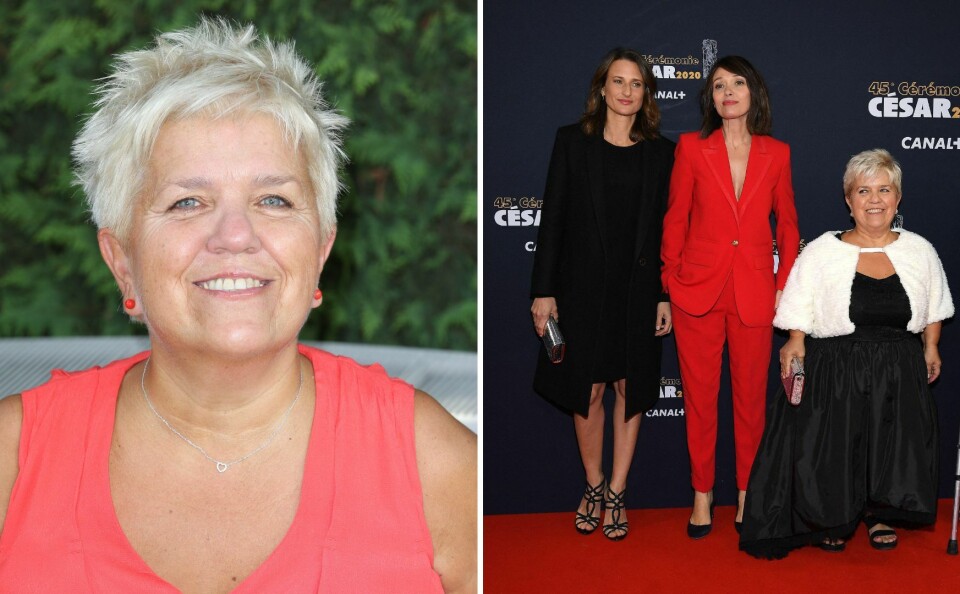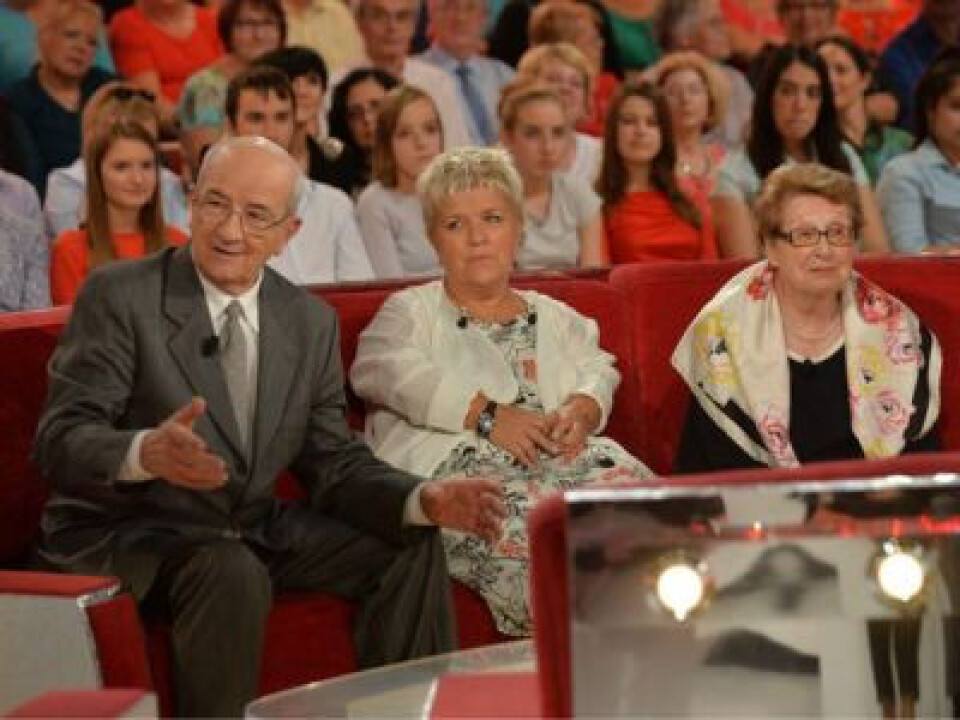-
How and when to watch the Six Nations rugby for free on French TV
France will play Ireland in the opening match at the Stade de France on February 5
-
Films and shows to watch in February to improve your French
From understanding l’accent du midi to scenarios that have divided critics
-
Films and series to watch in January 2026 to improve your French
France is a hub of talent when it comes to film and TV, and watching in French can greatly improve your language skills
Mimie Mathy: French TV star who turned disability into a driving force
She may be virtually unknown outside of France but outspoken Mimie continues to be one of the country’s best-loved actresses

There is a guardian angel watching over France’s 67 million people and her name is Joséphine Delamarre.
At least, that is the premise of the 21-season (and still going strong) TV series Joséphine, ange gardien.
Virtually every French person from the age of three, across all backgrounds, genders and regions, will have watched at least one of the 104 episodes in their lifetime.
Launched in 1997, it is among TF1’s most profitable shows, with viewing figures ranging from six to 11 million per episode.
The eponymous heroine, who uses a mixture of psychological insight, persuasion and magical powers to help people who have problems, is played by Mimie Mathy.
Loved in France
She is now not only one of France’s highest paid actresses, but among its best loved too.
Mathy, 66, has consistently ranked among the 50 Personnalités préférées des Français – an annual end-of-year popularity chart published by Le Journal du Dimanche – since 2002.
“I have to admit this chart makes me feel good. It is a little Christmas gift that I like,” she once told Europe 1.
She has also carved a career for herself in comedy and music and, since 1994, performed numerous times in the annual Les Enfoirés charity concert, raising funds for the charity Restos du Coeur.
Read more: 10 French songs that have sparked debate over the years
However, Ms Mathy’s path to success has not been an easy one.
Her parents never allowed her to wallow in self-pity
She was born with achondroplasia, a form of dwarfism, on July 8, 1957.
The oldest of three sisters, she grew up on the outskirts of Lyon. Her condition stopped her growth at 132cm, and Mathy claims to have understood as young as four, during a trip to the butcher, that it would mark her out as ‘different’ by the looks and comments she attracted.
However, she credits her parents with helping her put her situation into perspective, compared to other ailments and disabilities, and she was never allowed to wallow in self-pity.
Her father, an amateur saxophonist, also introduced her to music, and she developed an interest in theatre while performing at Village Vacances Famille holiday camps, which offered entertainment and activities for children.

Photo: Mathy with her parents in 2013; Credit: Abaca Press/Alamy
Found a teacher and a mentor
Keen to pursue her passion, Mathy applied to a French variety group called Le Big Bazar, which was set up by singer Michel Fugain.
He advised her to finish her studies first, but called her back in 1979, when she was 22, with an invitation to join the Atelier Fugain in Nice, the first music hall/variety school in France.
She chose the stage name Mimie rather than her real name Michèle – it was the nickname she was given when she started performing aged 17.
As well as teaching her the practical lessons for life in the entertainment industry, Fugain served as a mentor.
“Michel took over from my parents. He helped in telling me that I was different but that I should use it as a driving force rather than a weakness,” she said in 2001.
To Paris for stand-up comedy and small TV roles
Like most aspiring actor/singers, she was drawn to Paris and from 1982 to 1984 joined Le Petit Théâtre de Bouvard, a popular TV show showcasing the most promising French stand-up comedians and where future stars such as Les Inconnus, Chevallier et Laspalès and Muriel Robin rose to fame.
It was there that she met Michèle Bernier and Isabelle de Botton, with whom she formed a female comedy trio called Les Filles, and she soon started picking up small roles in TV films.
A string of stand-up shows from the late 1980s to the early 1990s helped her become a household name in comedy, and audiences packed Paris’s most popular venues, such as Le Point Virgule or Le Splendid, to see her.
Co-wrote and starred in hit TV film
Nationwide fame was achieved with Une nounou pas comme les autres (‘A nanny like no other’), a TV film she co-wrote for France 2 in 1993 that attracted 12.8 million viewers (52.7% of the audience share).
The follow-up Une nana pas comme les autres (‘A girl like no other’) secured 11.8 million viewers.
Mathy was lured to rival channel TF1 after it sent flowers to congratulate her on the success of the shows.
Laurent Chouchan, screenwriter of Une nounou pas comme les autres, pitched a new TV show about a guardian angel sent to Earth to resolve people’s problems – and the rest, as they say, is history.
Calls out French snobbishness over popular culture on TV
Joséphine, ange gardien was the making of the channel, pulling in jaw-dropping audience figures.
The show also helped launch the careers of many French actors and has been broadcast in Belgium, Switzerland, Italy and Quebec.
Mathy says she is often approached by strangers in the street who mimic the finger-snapping her on-screen character is famous for before disappearing back to heaven at the end of each episode. Children, she adds, will often call her ‘Joséphine’.
The show’s success and her natural likeability have seen plenty more work offers come Mathy’s way, including in an episode of the hit comedy-drama show Dix pour cent (‘Call My Agent!’), playing a caricature of herself.
She is equally well-known for her charity work – as well as fundraising for Les Restos du Coeur, she is a goodwill ambassador for Unicef.
Read more: Restos du Coeur winter campaign opens but funds too low to help all
Mathy is not afraid to speak up on issues she feels strongly about, calling out French snobbishness over popular culture on TV, for example.
She revealed in 2015 that she had to send a letter to the César Awards, the French equivalent of the Oscars, in order to be recognised as an actress and be able to vote.
“I wrote a letter to Alain Terzian [former president of l’Académie des César] saying ‘I don’t think that when Depardieu comes to make a TV film, he stops being an actor.’
“You’re not a TV actor or a film or theatre actor; you’re just an actor.”
Her successes have also been belittled in the left-wing media, but such criticism does not faze her.
“If you ask me to choose between a certain ‘intelligentsia’ – I am putting it in inverted commas because I am unsure of its intelligence – and the public, I do not hesitate and choose the public,” she said in an interview in 2017.
More recently, her outspokenness made news in July after a post on the social network X (formerly Twitter) lambasted a journalist who falsely claimed TF1 was pulling the plug on its flagship programme.
“Joséphine still has some great missions to accomplish,” she promised.
What has been said about Mimie Mathy
‘Joséphine? Like Joséphine, Ange gardien?’
What US film actor Brad Pitt reportedly said to a PR woman called Joséphine at the 2023 Cannes Film Festival.
‘She is the face of courage and self-sacrifice. It is an extraordinary feat to have overcome disability to such an extent and turn it into a strength. I think she has given a lot of inspiration to a lot of people. She is a life lesson’. Patrick Bruel, singer.
‘I said “If you’re big in your head, you’ll be big”. And she put all that into practice because she’s intelligent.’ Michel Fugain, singer.
Related articles
Models with disabilities are focus of photographer’s new French show
Interview with Ibrahim Maalouf: ‘I compose what comes from my heart’
























